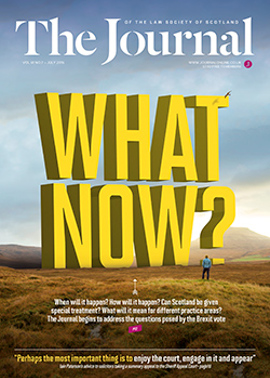Opinion: Rory Scothorne

After voting to leave the European Union, the United Kingdom is engulfed in almost every kind of crisis imaginable. The economy is reeling, with the value of sterling plummeting and job losses being announced daily. The constitution is on the ropes, with Scotland and Northern Ireland torn between unions after voting to remain in the EU. The party system is in a state of near collapse: both Conservatives and Labour are engulfed in bitter internecine disputes. Democracy is also in a quiet crisis, with only 36% of under-25s voting in the EU referendum, which raises serious questions about the future of electoral participation.
These problems have deep roots. The Electoral Reform Society has long argued that not only our voting system, but our whole political culture has produced strong feelings of disempowerment and anger amongst many in the country. One recent report has found that populist politics, of the kind that motivated much of the Brexit vote, have emerged over time from a range of widespread social, economic and technological changes which the political elite has been slow to adapt to (Claudia Chwalisz, The Populist Signal: Why Politics and Democracy Need to Change (Policy Network, 2015)). It argues that populism should be seen as a “signal” that politics needs to change – and it’s clear that Brexit is yet another signal that British politics needs fundamental reform.
The UK has been no stranger to constitutional change in recent years, but the changes we’ve seen clearly haven’t done the job. They have been ad hoc and piecemeal, cooked up far away from the general public by politicians and experts. Michael Gove’s statement during the referendum campaign that “the British people have had enough of experts” may have been questionable political spin, but there was an element of truth to it. One YouGov survey found that while “Remain” voters had a lot of trust for academics and economists, “Leave” voters had none – and indeed they did not express trust in any other options either (Ashley Kirk and Daniel Dunford, “EU referendum: Leave supporters trust ordinary ‘common sense’ more than academics and experts”).
Recent Scottish experiences of constitutional change, from devolution in 1997 to the Smith commission in the aftermath of the independence referendum, have continued the trend of elite-led reform. The Scottish Parliament was the product of a Constitutional Convention that claimed to represent all of Scotland, but the historian Ewen Cameron has written that “the Convention was neither a popular nor a representative body”. Even its leader, Canon Kenyon Wright, has said that the Convention was unable to communicate its ideas properly to the Scottish people (Ewen Cameron, Impaled Upon A Thistle: Scotland Since 1880 (Edinburgh University Press, 2010)). More recently, the Smith commission was made up of a small group of party representatives, while its proposals were rushed and never subjected to extensive public scrutiny. Continued calls for Scottish independence after the EU referendum have shown how ineffective these efforts have been at meeting Scots’ desire for constitutional change.
The dearth of further Scotland-centric constitutional proposals short of independence, and the interconnected nature of the UK’s various crises, suggest that joined-up UK-wide changes are now more necessary than ever. That’s why the Electoral Reform Society is calling for a UK-wide Constitutional Convention which is led by citizens, drawing on the skills of politicians and experts where they are needed. Our work with citizens’ assemblies discussing regional devolution in England has provided crucial insights into how such a convention might work, with ordinary citizens drawn from broadly representative samples to discuss devolution. The discussions were aided by trained facilitators and had input from politicians and academics. Trust was placed in citizens first, “experts” second, and what we found was that when people are offered the chance to have a say, they jump at the opportunity.
The focus of a Constitutional Convention could cover a range of issues, from electoral reform to further devolution. If proposals for another Scottish independence referendum emerge from the Scottish Government, a UK-wide Constitutional Convention could itself have devolved aspects, for example with Scots discussing independence as well as participating in UK-wide discussions of federal or confederal association. What matters is that a Constitutional Convention is citizen-led, giving it the legitimacy to deliberate on lasting, UK-wide solutions to the present crisis that have the support of people across the country.
In this issue
- Environmental law outside the EU
- 2014 revisited: championing Scotland in the EU
- “Justice for sale”
- After the fling
- Traps for the unwary
- Reading for pleasure
- Opinion: Rory Scothorne
- Book reviews
- Profile
- President's column
- Leading by example
- People on the move
- Brexit: a full menu
- Appeal of the new court
- Hostility enacted
- Socially motivated
- Back on the case?
- Send the client in?
- What does Brexit mean for planning and environmental law?
- Immigration meets licensing: not a marriage made in heaven
- Post-Brexit taxation: less of a certainty?
- Scottish Solicitors' Discipline Tribunal
- Community right and commercial sale
- Plane language
- Law reform roundup
- SSDT has a new clerk
- Covered by the terms?
- Ask Ash
- To boldly go...
- Hacking into the law
- Paralegal pointers






